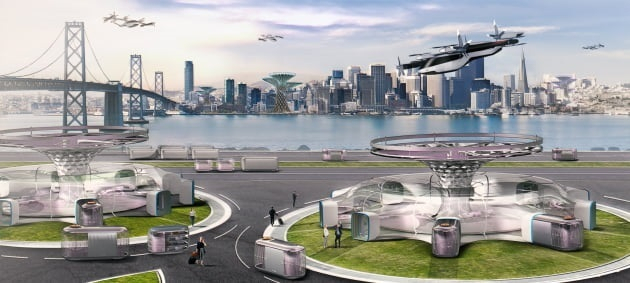
The government has drawn up new growth strategies to secure future technology such as aerospace and artificial intelligence and to accelerate digital transformation to help its sluggish economy leap forward.
Through the "New Growth 4.0 Strategy" unveiled by economy-related ministries on Wednesday, the country seeks to secure forward-looking technology, digital transformation and further expanding the country's prowess in chips and display panels to gain a competitive advantage over competitors.
Under the plan envisioned by the government, 15 projects have been selected for short-term and long-term goals ranging from one year to 10 years.
“As securing future cutting-edge technology will determine national competitiveness, expansion of new growth engines will be centered on core areas such as mobility, space and quantum computing,” the Ministry of Economy and Finance said.
For the backdrop of introducing such a plan, the government said the country's potential growth rate has declined steadily as its labor force grows older and the fertility rate has dropped to the world’s lowest.
“The private sector has lost vitality and momentum for making a new leap forward has weakened due to excessive regulation, increased dependence on state funding and growing internal and external uncertainties,” the ministry said.
While carrying out the project, the role of private sector will be strengthened and the government will provide support such as infrastructure maintenance, they said.
The government will push the semiconductors and display panels industries, the main vehicle for industrial growth in the Korean economy, to further strengthen their footholds and capture new foreign markets earlier than rivals.
To meet the goal, an additional high-tech semiconductor industrial complex will be established. The display business will be designated as national strategic technology to offer tax incentives for corporate research and development as well as facility investment.
Emulating the bio cluster in Boston which is home to over 1,000 pharmaceutical and biotech companies, South Korea will build its own version by 2025. Over 1 million people’s data on their genetic and clinical information will be collected to establish a data bank.
By 2030, infrastructure for autonomous driving will be completed, including Cooperative Intelligent Transport Systems that allow road users and traffic managers to share information.
Private urban air mobility service is planned to be commercialized by 2025.
To achieve its ambitions for its own independent space program, the country will push for the development and launch of a domestically built next-generation rocket and lunar module.
It aims to develop a 50-qubit quantum computer and three prototypes of quantum sensors, such as those for detecting defects in batteries and semiconductors, by 2026 and 2027, respectively.
For the pharmaceuticals and medical sector, the development of advanced regenerative medicine treatment and establishment of a new infectious disease response system will be pursued.
In order to accelerate digital innovation in the daily lives of people, the government will work together with companies to increase artificial intelligence and data utilization to the world’s highest and build a high-speed network to support it.
Building a high-efficiency data center using homegrown AI semiconductors and cloud-linked AI service development is also a part of the scheme.
The government will seek to improve data accessibility by establishing a national data infrastructure that links scattered data across public and private data platforms and portals by 2025.
It plans to carry out 6G commercialization technology development and establish a pilot network for low-Earth satellite communication, a solution for internet connectivity in rural areas.
Cutting-edge technologies such as AI will be implemented into the logistics sector to cut down delivery costs while enhancing speed.
Busan New Port and Jinhae New Port will be transformed into smart megaports that will introduce new logistics services using delivery robots and drones.
To support the "New Growth 4.0 Strategy" project, authorities will work on infrastructure such as R&D, human resources, finance and regulatory innovation.
The government will consider raising subsidies for companies’ research and development while giving private sectors to have more control on their R&D project management than bureaucrats.
To help companies make forays into new markets, it will actively participate in multilateral cooperation, such as cooperation in strategic markets like the Middle East and Southeast Asia, and take the lead in mapping out international standards.
Reducing the red tape around the biohealth, mobility, energy, tourism, finance, media and content industries will be reviewed, the ministry said.








![[KH Explains] Hyundai's full hybrid edge to pay off amid slow transition to pure EVs](http://res.heraldm.com/phpwas/restmb_idxmake.php?idx=644&simg=/content/image/2024/04/18/20240418050645_0.jpg&u=20240419100350)







![[From the Scene] Monks, Buddhists hail return of remains of Buddhas](http://res.heraldm.com/phpwas/restmb_idxmake.php?idx=652&simg=/content/image/2024/04/19/20240419050617_0.jpg&u=20240419175937)

![[KH Explains] Hyundai's full hybrid edge to pay off amid slow transition to pure EVs](http://res.heraldm.com/phpwas/restmb_idxmake.php?idx=652&simg=/content/image/2024/04/18/20240418050645_0.jpg&u=20240419100350)

![[Today’s K-pop] Illit drops debut single remix](http://res.heraldm.com/phpwas/restmb_idxmake.php?idx=642&simg=/content/image/2024/04/19/20240419050612_0.jpg&u=)